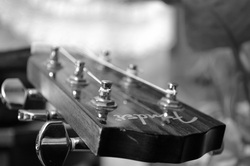
Bono riffed on a Bob Dylan song that “All I got is a red guitar, three chords and the truth.” My best advice to beginning songwriters is to go even simpler than that.
Start with two chords, and that’s all.
Choose a two chord progression that you can play over and over again with ease. As you continue to play it, let your mind and heart start to talk to you – they’ll tell you what you want to say with this song. They may do it in words, or in the form of a melody that you start humming without realizing it, or as an image of a scene in your mind’s eye, or even as a movement that you suddenly find your body wanting to make.
Go with it. Have an audio recording device ready, and a pencil & paper too, if you’re old-fashioned like me.
Play those two chords until the feeling is so clear that the words or a melody start to flow out. Keep going. The recording will free you up to not worry about how it sounds or if you remember it. And it’s very helpful to listen back whenever your idea seem to reach a stopping point, because almost every time, this will give you an idea of where the song wants to go next.
Obviously, at some point you’ll want to move musically to a different chord progression – maybe adding a third or fourth chord as you find yourself stating your main point in the chorus. And no need to limit yourself – but on the other hand, keep in mind that when emotional impact is your goal, simplicity is your friend.
Typical pop songs will throw in a bridge section after a couple of verse – chorus sections, before building to a final verse – chorus (or just a final chorus).
But the point is, rather than getting overwhelmed with “how” to write a whole song, just start with 2 chords, and the truth will follow.
I should probably mention that the first song I ever wrote started out with just two chords. D, G, D, G. I played that pattern over and over while getting the feeling of what I wanted to say with this song. It turned into a narrative called “Pioneer” that broke the rules of good songwriting by not including the word pioneer anywhere in the chorus, let alone anywhere in the song. But I loved it, and still do, because it expressed a part of my twenty-something spirit that always longed for a home that seemed just beyond reach. The poignant part for me is that, in listening back to it now, I hear that I was already home.
Wishing you many brave and freeing songwriting adventures. And I’ll be happy to help you learn many tools and strategies for songwriting as part of your music lessons at Songinflight Studio.
Start with two chords, and that’s all.
Choose a two chord progression that you can play over and over again with ease. As you continue to play it, let your mind and heart start to talk to you – they’ll tell you what you want to say with this song. They may do it in words, or in the form of a melody that you start humming without realizing it, or as an image of a scene in your mind’s eye, or even as a movement that you suddenly find your body wanting to make.
Go with it. Have an audio recording device ready, and a pencil & paper too, if you’re old-fashioned like me.
Play those two chords until the feeling is so clear that the words or a melody start to flow out. Keep going. The recording will free you up to not worry about how it sounds or if you remember it. And it’s very helpful to listen back whenever your idea seem to reach a stopping point, because almost every time, this will give you an idea of where the song wants to go next.
Obviously, at some point you’ll want to move musically to a different chord progression – maybe adding a third or fourth chord as you find yourself stating your main point in the chorus. And no need to limit yourself – but on the other hand, keep in mind that when emotional impact is your goal, simplicity is your friend.
Typical pop songs will throw in a bridge section after a couple of verse – chorus sections, before building to a final verse – chorus (or just a final chorus).
But the point is, rather than getting overwhelmed with “how” to write a whole song, just start with 2 chords, and the truth will follow.
I should probably mention that the first song I ever wrote started out with just two chords. D, G, D, G. I played that pattern over and over while getting the feeling of what I wanted to say with this song. It turned into a narrative called “Pioneer” that broke the rules of good songwriting by not including the word pioneer anywhere in the chorus, let alone anywhere in the song. But I loved it, and still do, because it expressed a part of my twenty-something spirit that always longed for a home that seemed just beyond reach. The poignant part for me is that, in listening back to it now, I hear that I was already home.
Wishing you many brave and freeing songwriting adventures. And I’ll be happy to help you learn many tools and strategies for songwriting as part of your music lessons at Songinflight Studio.
 RSS Feed
RSS Feed
